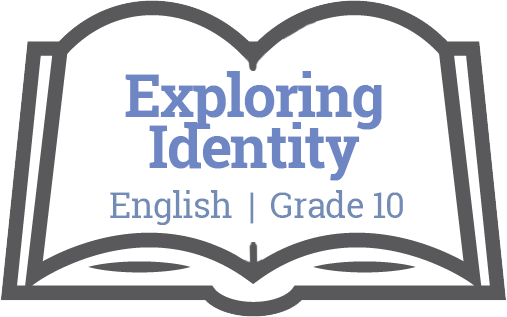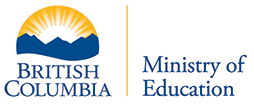
Unit Plan: Exploring Identity
English Language Arts / Grade 10

Big Ideas
The exploration of text and story deepens understanding of one’s identity, others, and the world.
Concepts:
- Identity
- Nature vs. Nurture
- Perspective/Voice in texts
Essential Questions
Students will keep considering…
- Who am I? How do I define myself ? How does my identity change and evolve?
- How does making connections between text and self deepen my understanding of my own identity?
- How does understanding my own identity help me to connect and empathize with others?
Evaluative Criteria
TEACHER EVALUATIVE CRITERIA
Criteria
Formative assessment:
Observation in class, participation in activities for each short story, completion of skill/knowledge components
Formative tasks:
- Box of Self
- Elements of Short Stories: completion of charts for all stories
- Reflective writing tasks based on three of the short stories
- Character monologue
- Self, peer and teacher feedback and reflection—ongoing throughout the unit
- Checkpoint quizzes
Summative assessment:
Personal Profile Performance Task
Rubric:
See attached Personal Profile rubric (DOWNLOAD)
Adaptations:
- Read aloud of all short stories: focus on the understanding of identity, not individual reading and decoding skills.
- Refer to NVSD Adaptations Checklist for further support
- Work with Learning Services staff to support with adaptations for students with IEPs
Differentiation:
- Requirements of the performance task product can be differentiated based on learning styles and needs
- Student choice in texts/sources: poetry, short stories, novels, web articles, non-fiction, movies, songs, documentaries, TV shows etc.
- Student choice in the presentation of the Personal Profile: blog, website, Prezi, PowerPoint, Show Me, Vlog etc.
Extension:
Students can add other components to the personal profile that include connection to the similar Big Ideas in other curricular areas
Monitoring Progress
Teacher will monitor progress:
Criteria:
Use techniques to check for understanding: exit tickets, quizzes, student interviews, observation, mini group presentations etc.
Differentiation:
- Allow students to select their own short stories for discussion, use videos or Totals around the identity theme, read aloud of text, partner activities as needed, use LAC teacher to support differentiation
- Lesson activities can be differentiated based on learning styles and student needs
Resources
Suggested Short Stories
Wild Horses by Brian Fawcett, The Persian Carpet by Hanan Shaykh, Legend of the Sugar Girl by Joseph Boyden, On the Sidewalk, Bleeding by Evan Hunter, Just Lather, That’s All by Hernando Telles
See also:
Reflection
How will teachers and their students reflect on and evaluate the completed project?
Constant feedback from students and dialogue after each activity outlined in the Learning Events will help to direct and adapt what is explored in the next activity. Self, peer and teacher evaluation of the Performance Task and its alignment with the essential questions.
Teacher:
Next time I teach this unit I would…
Allow students to select the short stories that link to Identity.
Student:
My students needed:
Process:
Product:
Content:
Potential Student Misunderstanding:
Stage 2 – Evidence
Authentic Performance Tasks
AUTHENTIC PERFORMANCE TASK: Assessing for Understanding
Students will be able to demonstrate their understanding by:
Personal Profile Task: Identity
PERFORMANCE TASKS RATIONALE: All of the following activities require students to be actively engaged in the learning task. Students will assume roles, argue opinions, share anecdotes, challenge classmates, debate issues, consume products, analyze human behavior, create authentic metrics, and make recommendations. For some students these activities will come easily. For others, teacher encouragement will be needed. Teachers will pay close attention to creating a safe atmosphere in the class for students to express personal opinions. They will also encourage all students to take risks with their learning when debating, role playing, or playing simulation games using curriculum material that is new to them.
> Click here to learn more about Performance Tasks
Task: My Personal Profile
Transfer Goals:
- Strengthen their understanding of themselves, diverse cultures, and multiple perspectives through the exploration of texts
- Think creatively, critically, and reflectively about language and texts as part of constructing and communicating personal meaning
Guidelines for the Personal Profile:
- Connect your identity to the elements of short stories and to specific texts of your choosing. Texts can be stories, novels, poems, song lyrics, non-fiction, etc.
- Use a minimum of three text sources
- Create an engaging, visually pleasing and well-written online presentation of you. Consider the many options for online presentations: Prezi, PowerPoint, ShowMe. blogs, vlogs, websites, Screencast-o-matic, video etc.
- Prepare an oral presentation or “tour” of your online Personal Profile
Suggested Components of the Personal Profile:
- Who Am I? Connect to characters in a specific text, link to family and the nature/nurture debate
- Where Am I From? Connect to setting from a specific text–how does where you live or your culture impact who you are?
- What is my Story? Connect to plot events in a specific text, and write a personal narrative of your identity story.
- What challenges have I had to overcome to get here? Connect to conflicts and how you have managed them in your life: speak to your resilience, morals and values.
- What is my vision of my life and myself? Connect to “quotable quotes” from specific texts that speak to you and reflect who you are.
- How do I want others to see me? Connect to specific texts and focus on point of view, tone, and mood, how do become a “voice” in society?
GRASPS
What is a GRASPS task?
Other Evidence
OTHER EVIDENCE: Assessing for Knowledge and Skills
Students will show they have acquired Stage 1 knowledge and skills by:
Students will show they have acquired Stage 1 knowledge and skills by…
- Defining the elements that determine identity: nature vs. nurture debate, the evolution of self through experience, family, conflict, etc.
- Reflective writing about short stories studied in class: understanding the identity of the characters and the author, learning to be empathetic and making connections back to themself
- Define and identify the Literary Elements (plot, theme, conflict, tone, point of view, character, setting etc.) commonly used in narrative
- Use of conventions, sentence structure, organization, description and persuasive techniques in writing for both formative and summative tasks

The following resources are made available through the British Columbia Ministry of Education. For more information, please visit BC’s New Curriculum.
Big Ideas
The Big Ideas consist of generalizations and principles and the key concepts important in an area of learning. The Big Ideas represent what students will understand at the completion of the curriculum for their grade. They are intended to endure beyond a single grade and contribute to future understanding.
Core Competencies
 Communications Competency
Communications Competency
The set of abilities that students use to impart and exchange information, experiences and ideas, to explore the world around them, and to understand and effectively engage in the use of digital media
 Thinking Competency
Thinking Competency
The knowledge, skills and processes we associate with intellectual development
 Social Competency
Social Competency
The set of abilities that relate to students’ identity in the world, both as individuals and as members of their community and society
Curricular Competencies & Content
Curricular Competencies are the skills, strategies, and processes that students develop over time. They reflect the “Do” in the Know-Do-Understand model of curriculum. The Curricular Competencies are built on the thinking, communicating, and personal and social competencies relevant to disciplines that make up an area of learning.
Additional Resources
First People's Principles of Learning
To read more about First People’s Principles of Learning, please click here.
For classroom resources, please visit the First Nations Education Steering Committee.
